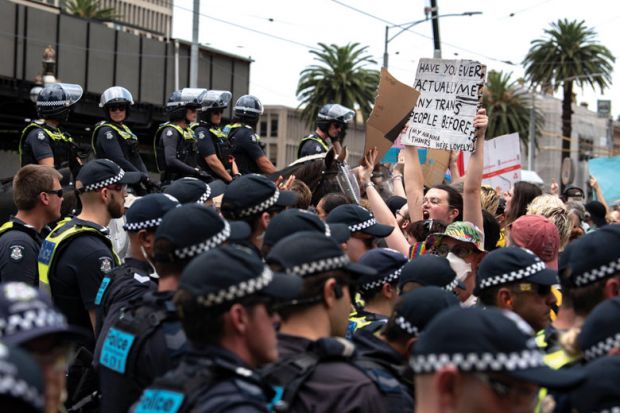An academic at the University of Melbourne has accused the institution of failing to protect her, claiming a senior leader’s criticism of an event she participated in helped to encourage a student campaign calling for a boycott of her classes.
Philosopher Holly Lawford-Smith – who teaches a class called “Feminism” at Melbourne – has attracted intermittent hostility as a “gender-critical” feminist who believes that biological sex is immutable. The campaign escalated after her appearance at Melbourne’s “Let women speak” rally outside Parliament House on 18 March.
Speakers at the rally, fronted by British activist Kellie-Jay Keen, also known as Posie Parker, objected to transgender women’s inclusion in female spaces and sporting teams. Counter-protests were organised by transgender rights activists.
Also seen at the event were neo-Nazis performing Hitler salutes, and opponents accused the rally organisers of allying themselves with far-right extremists. The organisers said they had been shocked when white supremacists gatecrashed the event.
Since then, posters plastered over Melbourne’s campus have decried Dr Lawford-Smith as a “fascist” who “spoke on the side of neo-Nazis”, adding that “only a fascist takes ‘feminism’. Are you on the side of fascists? Boycott this subject.”
Dr Lawford-Smith said that, although she had attracted material of this sort before, it had not previously named her or subjects she taught. She said she was forced to cancel one of her classes, for the first time, after Melbourne security advised that activists planned to disrupt it on 31 March.
In a 27 April email to faculty staff, arts dean Russell Goulbourne expressed concern at posters “that disparage one of our colleagues…unreasonably call into question the academic rigour of an officially approved university subject and…intimidate students who choose to take that subject”.
He said security staff had been “working hard” to remove the posters and “identify those responsible”.
But Dr Lawford-Smith said an earlier email sent by Professor Goulbourne to faculty on 24 March had emboldened those behind the campaign. In this, he characterised the Parliament House rally as being a place where “dehumanising views” were expressed that were “antithetical to my own values and to the values of our university”.
Professor Goulbourne had written that the appearance of neo-Nazis was intended to “protect the anti-trans campaigners and…antagonise the peaceful counter-protest”.
Asked why he had characterised the rally in this way given the disputed accounts of the events, and why he had taken five weeks to intervene in the boycotting campaign, Professor Goulbourne declined to comment.
A Melbourne spokesman said academic freedom and freedom of speech were “core values” at the university, but rigorous debate should never extend to “violence, intimidation or inappropriate behaviour”.
The group behind the campaign, Fight Transphobia UniMelb, explained its actions in a statement on its website. It said Dr Lawford-Smith’s students helped the university “legitimate and fund the harm” caused by her and “fascist sympathisers”.
Asked why students should not engage critically with her subject, a spokesperson for the group said constructive engagement was not “practicable” because of the “asymmetric dynamic” between an associate professor and the second-year students whose grades she determined.
Dr Lawford-Smith said the campaign against her had escalated with the plan to disrupt her class. “Does that just mean they come in and scream stuff, but don’t touch anyone? Or does one of them become a hero on TikTok if they can film someone punching me?
“A lot of people are gender critical, but we’ve never faced these conditions. I’m worried about whether I can keep teaching courses as I want to teach them. Will people just get too scared to say what they think so you have this false consensus?”
Dr Lawford-Smith has lodged a complaint with state regulator WorkSafe Victoria alleging that the university failed to provide her with a safe workplace, bullied her because of her political views and did not meet its commitments to academic freedom.
Times Higher Education understands that the university has launched three investigations of Dr Lawford-Smith’s activities. Two made no findings against her and a third is ongoing. The university said it “does not comment publicly on individual cases”.




